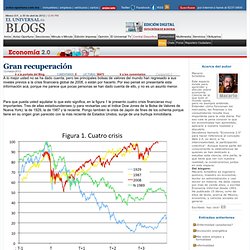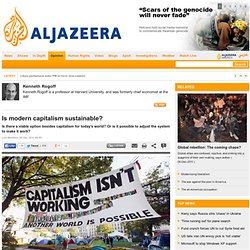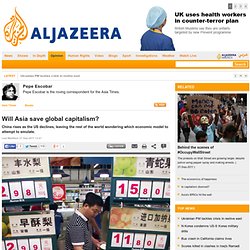

Opinión. Are we on the deck of another Titanic? New York, NY - Are we in a countdown to an economic collapse?

The other day, I was in a restroom papered over with pages of the New York Times from the Great Depression. It was very eerie - some of the stories sounded very contemporary. Every day we seem to be reading about new waves of layoffs and cutbacks, when we hoped to be reading about new jobs and recovery. Sony just announced it will "shed" ten thousand jobs worldwide (is that like a sheep shedding wool?). That's six per cent of its staff. El Universal - Blogs. A lo mejor usted no se ha dado cuenta, pero las principales bolsas de valores del mundo han regresado a sus niveles previos a la crisis financiera global de 2008, o están por hacerlo.

Por eso pensé en presentarle esta información acá, porque me parece que pocas personas se han dado cuenta de ello, y no es un asunto menor. Para que pueda usted aquilatar lo que esto significa, en la figura 1 le presento cuatro crisis financieras muy importantes. Tres de ellas estadounidenses (y para revisarlas uso el índice Dow Jones de la Bolsa de Valores de Nueva York): la de 1929, la de 1987 y la reciente. Pongo también la crisis de Japón de fines de los ochenta porque tiene en su origen gran parecido con la más reciente de Estados Unidos, surge de una burbuja inmobiliaria. Para poder ver juntas las cuatro, construí un índice que vale 100 para el punto máximo previo a la crisis, ocurrido en el momento justo del inicio de la crisis (marcado con T en la figura) o en el año previo.
Is modern capitalism sustainable? Cambridge, United Kingdom - I am often asked if the recent global financial crisis marks the beginning of the end of modern capitalism.

It is a curious question, because it seems to presume that there is a viable replacement waiting in the wings. The truth of the matter is that, for now at least, the only serious alternatives to today's dominant Anglo-American paradigm are other forms of capitalism. Continental European capitalism, which combines generous health and social benefits with reasonable working hours, long vacation periods, early retirement and relatively equal income distributions, would seem to have everything to recommend it - except sustainability. China's Darwinian capitalism, with its fierce competition among export firms, a weak social safety net, and widespread government intervention, is widely touted as the inevitable heir to Western capitalism, if only because of China's huge size and consistent outsize growth rate.
Problems not insurmountable? Britain's irrational faith in capitalism. For a long time British politicians have treated the world of business with something like religious veneration.

The last Labour government was always trying to make the public sector more entrepreneurial and consumer-focused. They loved it when management consultants and financiers told them that they had to modernise the state through the ever-greater use of market mechanisms. Their child-like faith in market forces would have been touching if the consequences hadn't been so disastrous. As chancellor and prime minister, Gordon Brown stood by while private banks vastly increased the stock of debt in the economy. Will Asia save global capitalism? More than ten years ago, before 9/11, Goldman Sachs was predicting that the BRIC countries (Brazil, Russia, India, China) would make the world economy's top ten - but not until 2040.

Skip forward a decade and the Chinese economy already has the number two spot all to itself, Brazil is at number seven, India tenth - and even Russia is creeping closer. Slavoj Zizek: Capitalism with Asian values - Talk to Al Jazeera. From the Middle East to the streets of London and cities across the US there is a discontent with the status quo.

Whether it is with the iron grip of entrenched governments or the widening economic divide between the rich and those struggling to get by. But where are those so hungry for change heading? How profound is their long-term vision to transform society? Slovenian-born philosopher Slavoj Zizek, whose critical examination of both capitalism and socialism has made him an internationally recognised intellectual, speaks to Al Jazeera's Tom Ackerman about the momentous changes taking place in the global financial and political system. Is capitalism bankrupt? - Counting the Cost. The world is a largely capitalistic economy - one that even communist China is embracing. But with a worldwide financial crisis, towering government debt and the public outrage of the 99 per cent, perhaps the free market is not free enough.
The world's largest economy, the US, has a $15.2tn debt. According to Tea Partiers, that is because government spending and central bank meddling has distorted the market. Occupy campaigners, however, argue that capitalism brings excessive wealth to the few. To even the most fiscally unlearned, the disparity is obvious.
The Economic Policy Institute has found that 1 per cent of US households control 42.7 per cent of the country's assets. And with wealth, comes influence - 24.3 per cent of all political donations in the 2010 election cycle were made by 0.01 per cent of Americans.